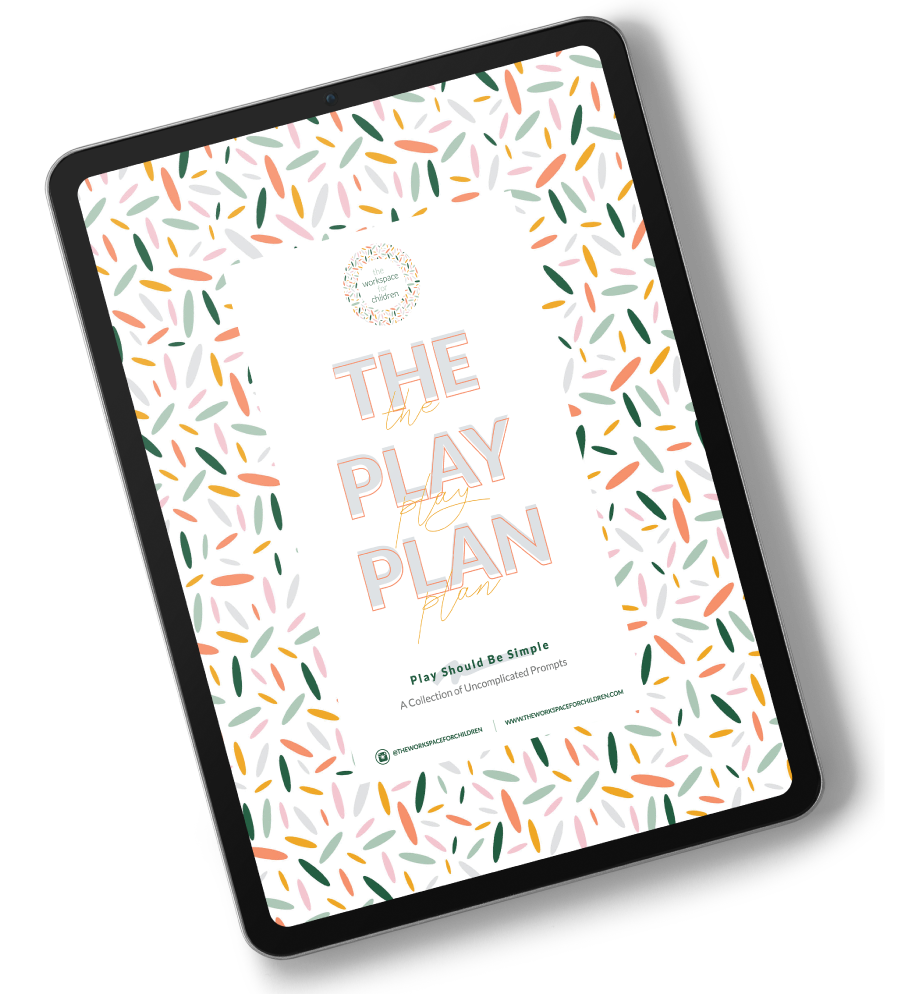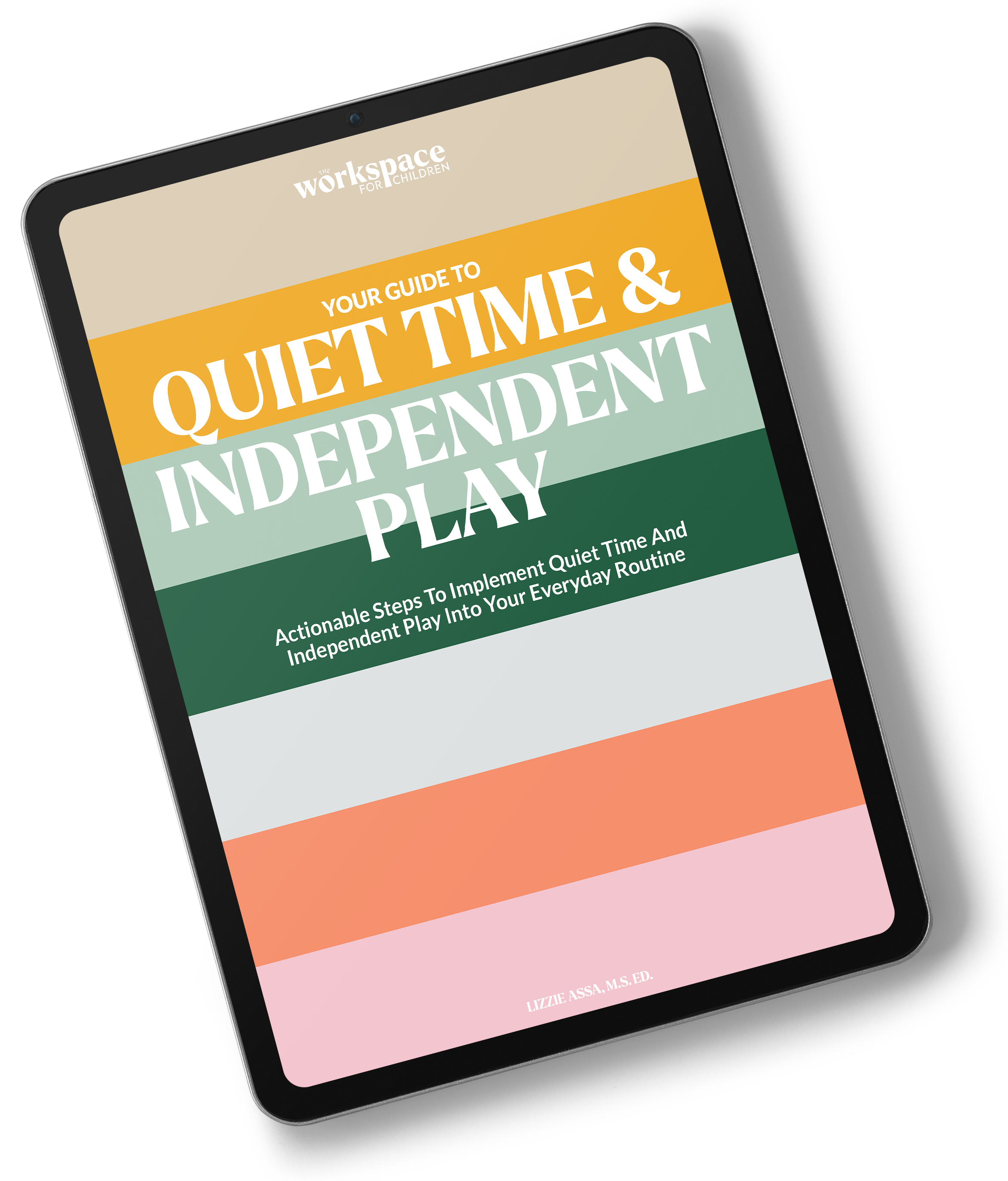How Ten Minutes Can Impact Your Child’s Whole Day
/What if I told you that there was a SMALL thing you could do right now that would make a MASSIVE difference in how the day goes for your child and you?
Read MoreWhat if I told you that there was a SMALL thing you could do right now that would make a MASSIVE difference in how the day goes for your child and you?
Read MoreYou just heard a crash from the playroom and your heart stops. He was working SO hard on that building. Cue the tears and tantrums of frustration…
Read MoreDo you find yourself repeating yourself over and over? See this post for some ideas.
Read MoreSetting limits is HARD. Setting limits when your child is melting down is even HARDER. Here are 4 steps to help you stay grounded and anchor you in the storm.
Read MoreDo your kids ask you to buy them things non-stop around the Holidays (or even year-round)? I have a simple strategy for you.
Read MoreIs “That’s not fair!” a common theme in your house? Read this.
Read More“I’m stupid!”. Does your child struggle when things become difficult? Here’s how to navigate these feelings and negative self-talk
Read More
Have you ever noticed that whatever type of mood you’re in, your family follows suit? Whether you like it or not, your mood as the parent sets the tone.
Whether you’re feeling happy and energized, or down and stressed out, your child is most likely feeling the same way.
Let’s talk about what you can do to help your child cope with stress and find relief when times are tough.
Stress makes it so hard to regulate our own emotions.
Snapping at your child because you are mad at your partner.
Tuning your child out because you are worried about finances.
Being impatient with your child when you are waiting on crucial medical results.
Feeling exhausted and defeated before your little one even plants that first kiss on your cheek.
All of these feelings are completely valid and normal to have, and I understand wanting to find a way to try and eliminate stress altogether.
However, stress is inevitable. Stress is part of living a full life, and eliminating stress is not the answer. Rather than eliminating stress, learning how to tolerate stress is the goal.
Even as adults, learning to tolerate stress can be difficult. So just imagine how hard it can be for your child.
The best thing we can do for our children when stress comes knocking on the door is to teach them coping skills by modeling and practicing them ourselves.
Here are 5 things to try the next time you notice your little one may be feeling overwhelmed, anxious, or stressed out:
Sensory play is a great way to reduce stress, as well as calm and soothe anxiety. By stimulating your child’s senses through sensory play, they become more grounded and are able to better regulate what they are feeling. This activity doesn’t have to be anything fancy. It can be something as simple as spinning in a chair, running and jumping in the wind, cooking, or water play.
If you need a resource of uncomplicated play prompts, The Play Plan might be for you!
Sleep reduces irritability and anxiety, so it only makes sense to make sleep a priority when you are feeling stressed out and run down. If your child is out of the napping stage, a way to ensure that they are getting extra rest is to make a conscious effort to get them to bed earlier. Don’t overcomplicate it - just aim for a bedtime 5 minutes earlier than the night before, and continue this for a few days.
Getting outside is not only an easy way to reduce stress but it has also been scientifically proven to reduce stress hormones! Don’t think that you have to plan an extravagant outing for your family in order for this to be effective! It could just be you and your child taking a walk around the block. Even the smallest amount of Vitamin D will work wonders to help you both feel more at ease.
Water in all forms reduces stress. Try adding fruit to your and your little one’s drinking water for some extra flavor, go swimming, jump in puddles, even take a mid-day bath just for fun! Honestly, the possibilities are endless with this one.
If you’re looking for a fun activity for your child that is sure to lighten their mood, check out this blog to learn how to put together a toy washing station. It combines sensory play, water, and you could even do it outside. They’ll love it!
Take 10 minutes for just you and your child to connect. Turn off the screens, put the toys away, and just be. Sometimes the only thing our children need from us is our full attention. Be present and enjoy this time with them. Make eye contact, and let them know that you’re there for them.
I wish I could take away your worries and make everything turn out the way you want it to.
I know what it’s like to be feeling stressed out and then have “mom guilt” sneak in and make you feel like you are not doing a good job. I also know that you are an amazing parent.
By learning to cope with stress and teaching your children to do the same, you are giving them one of the best and most valuable life lessons you could possibly give them!
I hope you enjoyed this blog!
For more support and tips related to this topic, join The Workspace for Children community on Instagram! Let’s parent together.
Today's blog post discusses the power of words of affirmation in parenting. It emphasizes the importance of recognizing and verbalizing positive qualities in our children and how it can build their self-esteem and self-image.
If you have a child who constantly seeks attention and feedback, you might think they’ll never play independently. Try these simple tips…

THE PLAY PLAN
The Play Plan is an ebook containing play invitations that are easy to set up, inexpensive, and apply children of all ages. The 25 play prompts are divided into five categories and use items that you most likely already have at home. These play prompts consider children of all ages, all developmental stages, and all learning capabilities. Each prompt can be tailored to fit your unique child’s needs. Play is meant to be simple.
$28

QUIET TIME AND INDEPENDENT PLAY EBOOK
This downloadable ebook is your personal guide to Quiet Time and Independent Play. This ebook will teach you the basic steps to implementing a Quiet Time and Independent Play strategy that works. The guide teaches you my proven 5 step method for implementing a daily break without using screens. (Guide includes 5 bonus invitations to play.)
$27

Have you ever found yourself frustrated and yelling at your child mid-meltdown? Using bribes, threats, and anything else you can think of to try to get them to calm down? It usually doesn’t work, right?
What if I told you there was a way to manage your child’s meltdown before it even happens? Sound too good to be true? Here’s how to do it.
Picture this: You're in the supermarket and all of the sudden your child is on the ground kicking and screaming because they just have to have the Goldfish RIGHT NOW.
What can you do?
First, remember that tantrums and meltdowns are NORMAL. Even as adults, it’s okay (and necessary) to have an occasional release of pent-up emotions.
But how do you do this before you find yourself in a supermarket situation?
In the moment, stay calm, hold your ground and ride out the storm. It happens to the best of us.
Check out this post for helping your child cope with their frustration during a meltdown.
Now let’s talk about heading off tantrums at the pass…
When your child starts having a meltdown, it’s normal to start calm and collected and then as things get worse, begin to (over)react and start having a meltdown of your own. It’s difficult to regulate your emotions while you are in the moment. I’ve been there!
Begin modeling and practicing small tantrum-worthy situations as a part of everyday life.
(See examples below)
You just dropped a stack of clean folded laundry. How frustrating! That took you so long to complete. Let your child know how you are feeling.
“How frustrating! I wish that wouldn’t have happened.” Then, take a deep breath and say, “You know what? I’m deciding to refold the shirts now, and then I’ll refold the rest of the laundry after dinner.”
“Argh! Waiting for my coffee is so hard. I want it RIGHT NOW! I’m going to count all of the red things I can find while I wait, will you help me?”
Asking your child for help will hook their attention!
“I really wish I could stay in bed for longer this morning and read my new book. I’m feeling grumpy and don’t want to leave to go to the doctor. You know what? I’m going to write myself a reminder that tonight I want to go to bed early so that I have extra time to read before I get sleepy”.
Modeling how to manage these frustrating situations works because you are normalizing common feelings. By showing your child which action steps to take in these scenarios, you teach them how they can do it themself.
Later in the day, try reminiscing about the frustration you experienced earlier that day.
“Remember when I dropped the laundry this afternoon? …”
“Remember when it was hard for me to wait for my coffee? You really helped me stay calm by counting all of the red things with me.”
“Remember when I didn't want to get up this morning?...”
Teaching and practicing these everyday situations will play a HUGE part in helping your child access these skills when they need them most.
Be consistent and practice often! These coping skills take time to develop.
I hope you enjoyed this blog! If you want to keep up with more Workspace for Children content, follow along on Instagram by clicking HERE.
Today's blog post discusses the power of words of affirmation in parenting. It emphasizes the importance of recognizing and verbalizing positive qualities in our children and how it can build their self-esteem and self-image.
If you have a child who constantly seeks attention and feedback, you might think they’ll never play independently. Try these simple tips…

THE PLAY PLAN
The Play Plan is an ebook containing play invitations that are easy to set up, inexpensive, and apply children of all ages. The 25 play prompts are divided into five categories and use items that you most likely already have at home. These play prompts consider children of all ages, all developmental stages, and all learning capabilities. Each prompt can be tailored to fit your unique child’s needs. Play is meant to be simple.
$28

QUIET TIME AND INDEPENDENT PLAY EBOOK
This downloadable ebook is your personal guide to Quiet Time and Independent Play. This ebook will teach you the basic steps to implementing a Quiet Time and Independent Play strategy that works. The guide teaches you my proven 5 step method for implementing a daily break without using screens. (Guide includes 5 bonus invitations to play.)
$27
Struggling with hitting? Read this.
Read More
Why Your Child's 'Difficult' Behavior Might Be Their Best Attempt to Communicate